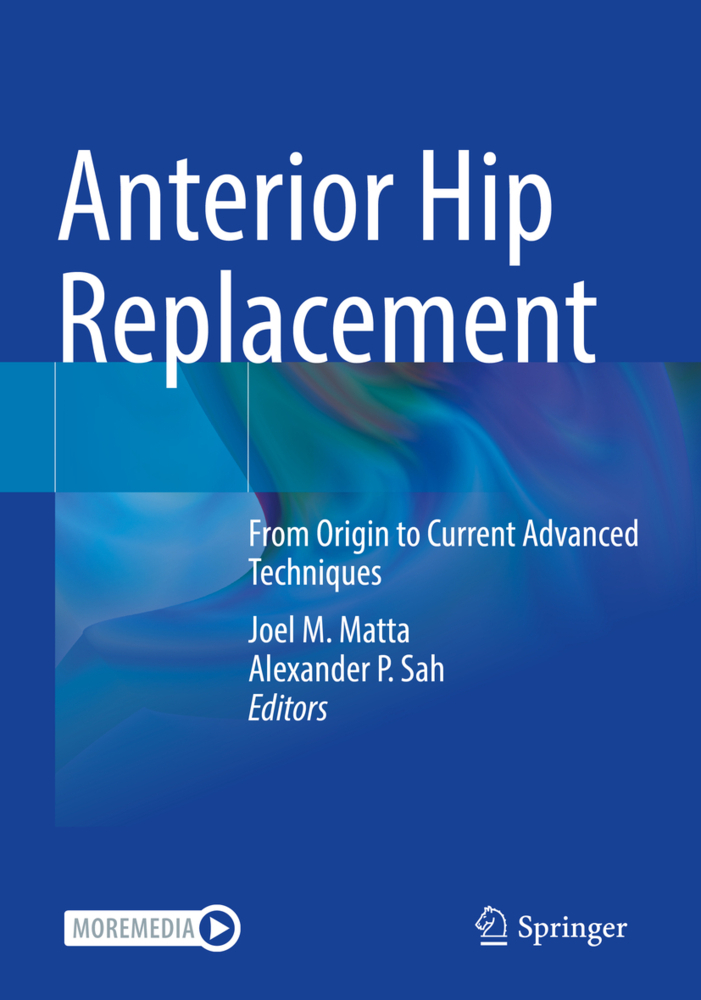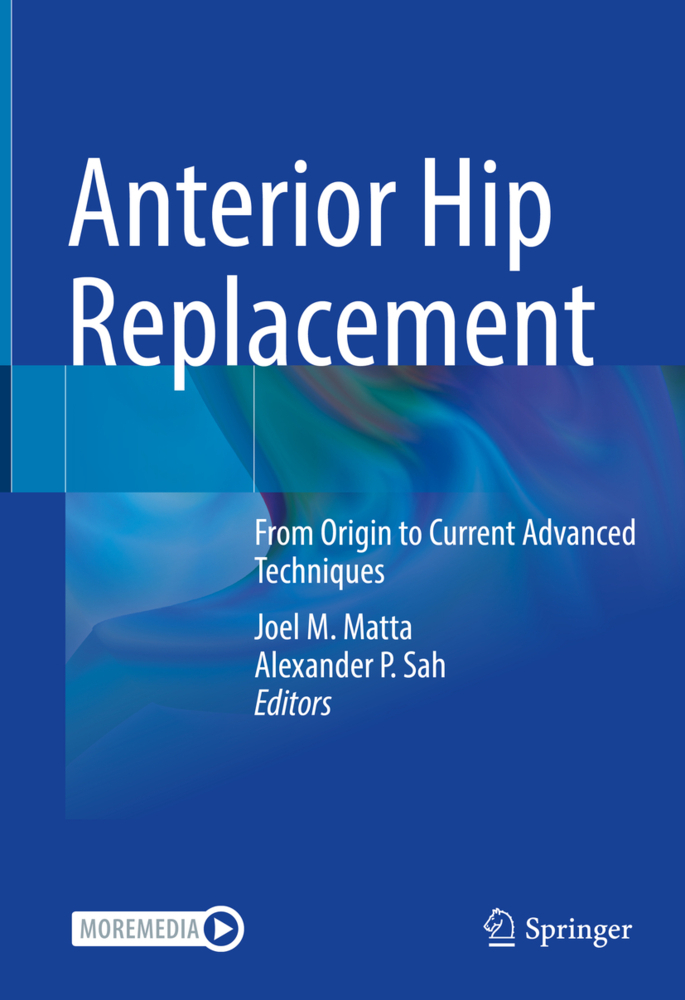Anterior Hip Replacement
Anterior Hip Replacement
Anterior hip replacement is a surgical approach that has dramatically changed the landscape of modern hip replacement. The approach is common to orthopedic trauma surgery, but it has been rapidly adopted in recent years for hip replacement as well. Its proposed benefits as a muscle-sparing surgery include less tissue trauma, faster recovery, and fewer hip precautions. While the technique can be challenging during initial learning and early adoption, the approach continues to increase in utilization in the U.S. every year because of these benefits. Understanding the initial development of the anterior surgical approach for hip replacement creates the foundation to better understand its modern clinical benefits and possibilities with advanced techniques. Furthermore, a detailed description of the reasoning behind the continued developments of the anterior approach helps in understanding the key elements needed to obtain the most successful outcomes.
With the continued adoption of this technically challenging technique, there is a need for a comprehensive resource for newly adopting surgeons and surgeons in training, but also for experienced surgeons looking to enhance their skill sets. Written by experts in the field, this book presents the tips and tricks learned after years of experience by a wide spectrum of surgeons. Parts 1 and 2 describe the origin and background of the anterior approach for hip replacement, with early lessons learned, important tips when training others, and how to master the operating table and c-arm. Parts 3 and 4 cover hip biomechanics and variations on techniques and technologies, respectively, while part 5 is a unique compilation of surgeons' perspectives on managing common aspects of the approach. Revision surgery is described in part 6, and future directions for the technique are discussed in part 7, along with emerging navigation and technologies.
Every year, there is an increasing number of orthopedic surgeons learning and adopting the anterior hip approach who would benefit from the resources in this book, which will serve as a critical learning tool for training surgeons and also as the go-to reference for optimizing current use and advancing future possibilities of the approach.
<b>Part 1. The Origins of the Anterior Hip Surgical Approach.</b>- 1. The French Beginning and Judet School of the Anterior Approach
2. My French and American Beginning and Evolution of the Anterior Approach<b>Part II. The Anterior Approach: An Established and Repeatable Technique</b>
3. The Anterior Approach Surgical Technique for Total Hip Arthroplasty: The "Matta Method" of 2020
4. Understanding the Modern Surgeon's Transition to Anterior Hip Replacement
5. The Learning Curve for the Anterior Approach: Early, Middle, and How It Continues
6. Introducing the Direct Anterior Approach (DAA) at a Swiss University Hospital
7. Challenges in Anterior Approach Education
8. Why I Favor a Standard Incision and Keys to Exposure for the Anterior Approach
9. Anterior Approach to the Hip Through the Oblique "Bikini" Incision
10. My Keys to Getting the Acetabulum Right with the Anterior Approach: Exposure, Preparation, Sizing, Position, Stability
11. My Keys to Gettingthe Femur Right with the Anterior Approach: Exposure, Preparation, Sizing, Depth of Insertion of Stem, Ball Head, Stability
12. Diagnosing and Managing Complications from the Anterior Approach
13. Tips and Tricks for Your First Anterior Hip Replacement
14. OR Efficiency: Radical Time Transparency and Operational Excellence
15. Results of the Direct Anterior Approach for Total Hip Arthroplasty
16. Difficult Cases in Primary Anterior Total Hip Arthroplasty
17. Direct Anterior Approach THA for Treatment of Femoral Neck and Acetabular Fractures
18. Anterior Approach Total Hip Arthroplasty Following Previous Femoral and Acetabular Fractures
<b>Part III. Hip Biomechanics: What Are We Trying to Achieve?</b>
19. Normal Hip Biomechanics
20. Key Concepts and Methods for Acetabular Positioning
21. Understanding Leg Length and Offset
<b>Part IV. The Anterior Approach: The Variation of Techniques and Technologies</b>
22. The Anterior Approach: From Robert Judet's Work to AMIS® (Anterior Minimally Invasive Surgery)
23. The History of the Direct Anterior Approach in Innsburck
24. The Direct Anterior Approach on a Standard Table in Zurich
25. A Hybrid Technique with a Standard Table and Mechanical Leg Holder
26. My Continued Evolution of the Anterior Approach
<b>Part V. Controversies in the Anterior Approach: Surgeon Perspectives</b>
27. The Orthopedic Table versus the Standard OR Bed for the Anterior Approach
28. Handling the Hip Capsule with the Anterior Approach: Repair versus Capsulectomy
29. Judging Leg Length and Offset with the Anterior Approach: Clinical Evaluation versus Fluoroscopy
30. Does Pelvic Tilt Change Anything with the Anterior Approach?
31. Getting Correct Cup Position with the Anterior Approach: Bony Landmarks versus X-ray versus Computer Guidance
32. Stem Choice for Anterior Approach Total Hip Arthroplasty: Surgeon Perspectives
33. Hip Resurfacing Arthroplasty Using the Hueter-Anterior Approach
<b>Part VI. Revision Surgery Using the Anterior Hip Approach.</b>- 34. Revision Surgery Exposure Techniques for the Anterior Hip Approach, Including Osteotomies
35. Complex Femoral Revision Using the Direct Anterior Hip Approach
36. Femoral Revision Total Hip Arthroplasty Using the Direct Anterior (Hueter) Approach
37. Complex Acetabular Reconstruction Using the Direct Anterior Approach
38. Treatment of Acute and Late Infections Using the Direct Anterior Approach
<b>Part VII. Future Directions in Techniques and Technology for the Anterior Approach</b>
39. Navigation Technologies for the Anterior Approach in Total Hip Arthroplasty
40. Robotic Total Hip Replacement with Direct Anterior Approach
41. Problems to Solve and Potential Future Directions for Anterior Approach Total Hip Arthroplasty.
Matta, Joel M.
Sah, Alexander P.
| ISBN | 978-3-030-91898-9 |
|---|---|
| Artikelnummer | 9783030918989 |
| Medientyp | Buch |
| Auflage | 1st ed. 2022 |
| Copyrightjahr | 2023 |
| Verlag | Springer, Berlin |
| Umfang | XV, 494 Seiten |
| Abbildungen | XV, 494 p. 472 illus., 340 illus. in color. |
| Sprache | Englisch |








